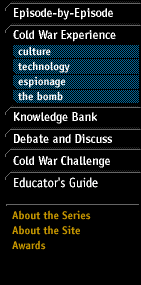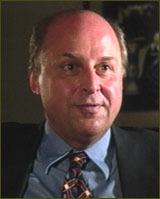 
This site is best viewed with
a 4.0 browser and requires javascript |

|
||||||||||
 |
|||||||||||


|
John Negroponte, a career U.S. diplomat and former aide to Henry Kissinger, was U.S. ambassador to Honduras from 1981 to 1985. He was interviewed for this episode of COLD WAR in September and October of 1997. On Soviet-Cuban involvement in Central America: I certainly think [the Soviets] must have enjoyed our discomfort. Whether they micromanaged this or not, I just I don't know. I'd be reluctant to say. My working hypothesis was that they sort of let Cuba have the lead on this, and basically said to them: "Have at it boys, and see what you can accomplish." ... I don't think there was any doubt of Cuban involvement. There was evidence of that -- of people being trained in Cuba, recruited in those countries, be it Nicaragua, or El Salvador in particular. Trained in Cuban training camps and then reinfiltrated back into their countries. I think there also had been, just before I got to Honduras, a rather spectacular capture of an arms shipment from Nicaragua, [headed] across Honduran territory destined for El Salvador. And I think that some of that equipment had been also to Cuba and the Soviet bloc. But certainly in my own mind I had no doubt that these [Central American] conflicts were being fueled by Cuba, and I think by implication by the Soviet Union. ... The experience of the late 1970s was for the United States, I think, a very sobering one. Indeed, as far as the Cold War is concerned, you have in particular two events: the Vietnamese invasion of Cambodia in 1978, and the ensuing Soviet invasion of Afghanistan in 1979. So viewed in that context, what then started to happen in El Salvador and in Nicaragua were I think of considerable concern to Washington: "Well gee, is this all a part of a pattern? And if it is, or if that appears to be the case, then we really have to do something about it." ... It was a central American domino theory if you will: so that if it happened at first in Nicaragua then in El Salvador and if they succeeded in El Salvador, then presumably they would try to finish off the situation in Guatemala, which was rather ripe at the time, you may recall. And then maybe Honduras would have fallen of its own volition, without necessarily even having to make that much effort. That was the theory in any case, and it seemed a plausible hypothesis at the time. ... I think it has [always] been recognized that Central America had vulnerability, both politically and economically, because of their social structure, because of their excessive dependence on a very small number of products for export, because of the disparities in wealth between the rich and the poor, and so forth. ... There is no question that these societies were vulnerable politically and socially. The point was whether just because of these vulnerabilities, should we allow external forces such as the Cubans or the Soviets to come in and try to take advantage of those situations? That was the issue. And that was what we were reacting to and that is why we put so much effort into Central America. On U.S. support for Central American dictators: We were all extremely focused on encouraging the electoral process in each of these countries. Certainly in El Salvador. ... Some of these regimes, to the outside observer, may not have been as savory as Americans would have liked; they may have been dictators, or likely to [become] dictators, when you would have been wanting to support democracy in the area. But with the turmoil that [was there] it was perhaps not possible to do that. ... Those of us who actually were working in the region at the time will point out how strongly committed we were to supporting the democratic process and encouraging elections, in spite of the fact that a war was going on in several of these countries. So I don't think there was any thought on our part of supporting authoritarian behavior for some short-term expediency. To the contrary, I think we bent over backwards to press for elections and for democratic reform. And I think you can certainly see evidence of that in El Salvador and in Honduras as well. ... Shortly after I arrived [Honduras] had the first presidential election for a civilian president in nine years. They conducted mid-term elections during the time I was there. That pattern replicated itself throughout Central America. So I think that the commitment to the democratic process was very, very much a part of our of our strategy and our policy. And frankly I think that some of the retrospective efforts to try and suggest that we were supportive of or condoned the actions of human rights violators is really revisionistic. On the U.S. invasion of Grenada: I was not involved and I don't remember much, but I remember one thing very vividly, which was that I basically learned about the invasion of Grenada from the president of Honduras, who called me up to say "Do you know what's going on?" And I said, "Well I have an idea, but I don't know for sure." And he said "Well, you're invading Grenada." He said, "Please tell the troops that when they're finished there to just keep on coming to Nicaragua." ... I think people took Grenada for what it turned out to be, which was a very specific incident and from which one couldn't necessarily make a lot of generalizations. On the other hand, of course, it was a signal that we could act decisively. On the Cold War's effect on Central America: Well, there was great suffering. Perhaps if one could have foreseen what would have happened in the Soviet Union and in Eastern Europe in the late 1980s and early 1990s, perhaps one could argue that some of this conflict may not have been necessary, and that maybe these things would have turned out the same way without all this conflict. There certainly were a lot of deaths, a lot of suffering, a lot of refugees, a lot of population movements. On the other hand, I think an equally if not more compelling case can be made that had we not done something to stop communist regimes from being established in the other Central American countries, other than Nicaragua -- say that they had been established in El Salvador and then in Guatemala and possibly even Honduras during the 1980s -- if we hadn't taken the steps that we took, I think the immediate suffering could have even been considerably greater -- through population movement, the loss of human freedom, the degradation of economic conditions. It seems to be that when these communist regimes take over -- if you look at the example of Vietnam or Cambodia or Nicaragua -- that even in conditions of peace they don't seem to be able to figure out how to support their people, and the human suffering is enormous. But I think on balance if you look back at what we did, I think a good case can be made that there was actually less suffering in Central America as a result of the actions the United States took than there would have been if we had just folded our arms and done nothing. |
||||||||||
|
Fidel Castro | John Negroponte | Daniel Ortega Howard Hunt | Ana Guadalupe Martinez | Oscar Sobalvarro
|
|||||||||||